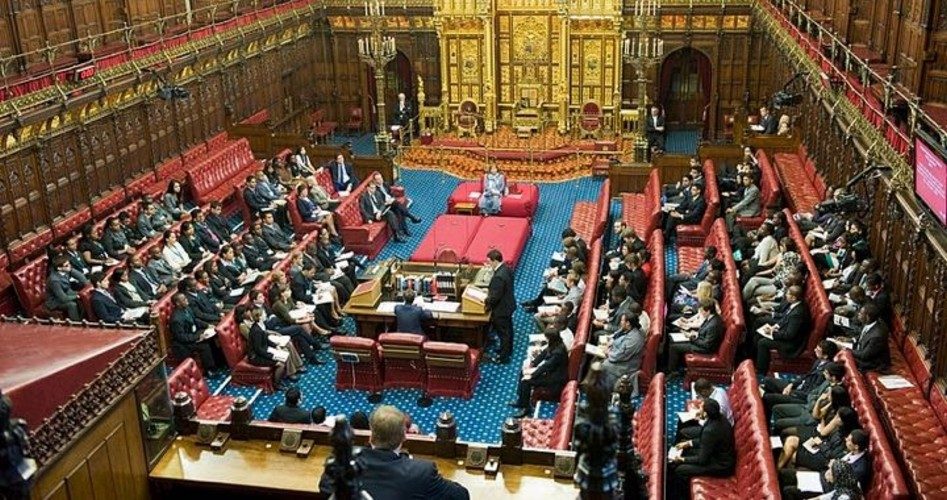
The globalists are not going away quietly in England. The British House of Lords inserted an amendment on Monday evening to the EU Withdrawal Bill, designed to give Parliament the power to block Britain from leaving the European Union without a “deal,” or even forcing Prime Minister Theresa May to negotiate a deal before consummating the United Kingdom’s divorce from the EU. The vote was 335-244.
“It is not acceptable for an unelected house to try to block the democratic will of the British people,” Liam Fox, international trade secretary, told BBC Radio 4’s Today. Fox was one of the strongest supporters of Brexit during the 2016 campaign, which eventually resulted in a popular referendum among the British people to terminate their membership in the EU.
What such a requirement could lead to, Fox warned, was the possibility of “delaying exit from the EU indefinitely.” Fox insisted that the option of “leaving the EU without an agreement” had to be kept on the table, for otherwise, the blockage of a “deal” between the EU and the U.K. could be used to thwart Brexit altogether. Fox said it was time to have a “big debate” on whether an “unelected house” [the House of Lords] could “thwart the view of the British electorate.”
The amendment in the House of Lords was proposed by Viscount Hailsham. It would provide that Parliament would determine what the government did if Parliament rejected the final agreement, or if the government proved unable to reach a deal at all with the EU. Hailsham told the House of Lords that the principle of parliamentary sovereignty was “fundamental to our liberties and must not be betrayed” when it came to Brexit.
This seems almost to be what British author George Orwell termed doublespeak. During the long tenure of EU membership, the British Parliament was growing increasingly less sovereign, and increasingly redundant. More and more laws were being dictated in Brussels by an unelected elite, leaving Parliament with less sovereignty with each passing year.
Legally, the lords — who are all appointed, not elected — are unable to prevent bills from being enacted, but they can delay the passage of bills, forcing the House of Commons to reconsider. While the lords cannot “thwart the view of the British electorate,” any delay in the enactment of a bill passed by the Commons could theoretically lead to the members of the Commons to change their original vote.
It does not appear that the ruling Conservative Party government in the House of Commons is inclined to defer to the House of Lords in this matter, however. Prime Minister Theresa May reacted to the vote in the House of Lords strongly, saying that the government’s response will be “robust.” A spokesman for the prime minister told reporters that the Cabinet had expressed “strong disappointment” with the action of the lords, reiterating their support for Brexit. “We wish for the bill to go through in the same way it left the Commons.”
The prime minister met with her Cabinet early Tuesday morning, and charged that the action of the lords risked tying the hands of the May government in negotiations with the EU. The government expects to persuade members of Parliament to strike the lords’ change when the bill returns to the Commons later this month.
But it does give Brexit opponents more time to create opposition to what the British people voted on less than two years ago, something some party leaders advocate. Labour Party leader Jeremy Corbyn favored substituting the will of Parliament for the will of the British people: “Parliament must be sovereign on this matter and make the final decision.” Corby said the vote by the lords was a “hugely significant moment,” and he still hoped Parliament would have a “proper role” in the Brexit negotiations.
Some in Britain have advocated that the country should join some sort of customs union with the EU once Brexit is completed. Fox, however, strongly opposed that option. “No, I don’t think we can stay in the customs union for a number of reasons, the main reason being that we would be in a worse position that we are today. If we were in a customs union with the European Union we would have to accept what the EU negotiated in terms of market access to the U.K. without the U.K. having a voice. I don’t think there is a customs union that could ever be acceptable.”
Lord Howard, a former leader of the Conservative Party, also weighed in against what the House of Lords did. He told the BBC’s Daily Politics show that the lords were “playing with fire,” and the action Monday night “reveals the appalling lengths to which the die-hard Remainers are prepared to go to achieve their aims.”
The May/June edition of Foreign Affairs, the official publication of the globalist Council on Foreign Relations (CFR), expressed concern that “democracy” was dying in Europe and in America. But in the examples offered, it would appear that their concern is that the general population is not going along with the goals of the globalist elites. (They were particularly concerned at the election of Trump, Brexit, and the growing opposition in Europe to immigration.) The British people voted to leave the globalist European Union, but this “democratic” decision of the people of the United Kingdom is clearly not respected by the CFR, or by their globalist allies in Britain.
Photo of House of Lords: U.K. government



